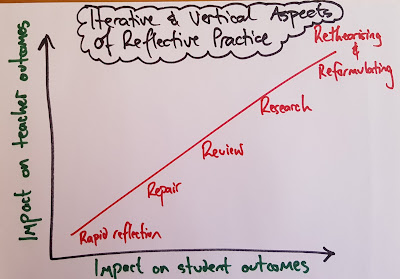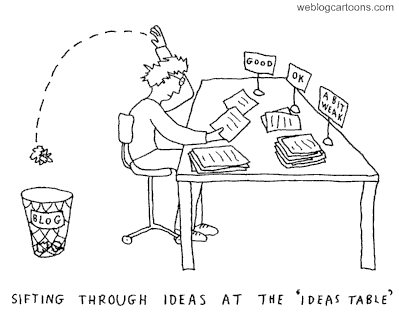Activity 1: My Reflective Practice
Reflective practice is seen as an essential component of professional
competence (Larrivee, 2000; Finlay, 2008; Mann, Gordon & McLeod, 2009) and implicitly underpins
the professional standards and code of ethics in New Zealand Education (New
Zealand Education Council, 2017). Self-reflection
is a product of increasing consciousness of self which has evolved over time as
a product of higher mental functioning (Gillespie, 2007). This implies we are predisposed to
self-reflection and instinctively take part in it.
“The path of least resistance and least trouble is a
mental rut already made. It requires troublesome work to undertake the
alteration of old beliefs.” John Dewey
Dewey seem to encapsulate both the value and tension that exists within
reflective practice. We know it is of
value, yet to reflect deeply/critically requires time, effort and energy –
often in short supply – reducing it to a simplistic/mechanistic process to
“get it out of the way”. Being told to
be reflective merely exacerbates this. After
29 years of teaching experience, I am no different.
I would argue that any form of reflection undertaken with respect to
personal practice is better than no reflection at all. Reflection of/on/about practice exists along
a continuum and where we choose to operate along that is a product of the context
and complexity of the situations in which we find ourselves.
Taking both
the iterative and vertical dimensions of reflective practice (Mann, Gordon& MacLeod, 2009) - see previous blog post - I have conceptualised my
reflective practice below (Figure 1):
Figure 1
As the degree of vertical complexity increases, the depth of the
iterative process increases. Like most
teachers from the MindLab Evaluate your reflective practice - July 17 Survey, I tend to operate at the first three levels because there seems to be a
sense of urgency/desire not to have something happen “that way” again. To “fix” the issue quickly. I do not feel the need to invest a lot of
time because the circumstances tend to preclude relatively simple solutions.
As the following conditions present:
- Increased benefits to myself and students
- Increased complexity of systemic change
- Increased risk to myself, staff, and students
I move to the higher levels of reflection. This is not only a matter of due diligence,
but also being able to have the time
to research and critically theorise the potential outcomes so an informed
decision can be made before committing to taking action.
Personally, the iterative process at the higher levels of complexity are
the most challenging. In particular, the
increasing “requirement” to include the “feeling” dimension within my preferred
model (Gibb’s Reflective Cycle). This is
a product of my personality. I am
process oriented and tend to be an “abstract theorist” or assimilator” within
Gibbs’ model. This means I prefer the
evaluative, analysis and conclusion stages of the process to the potential
detriment of addressing the role of feelings.
Feelings can get in the way of purposeful reflection as they can take
people in directions that detract from the core issue at the centre of the
reflective process. Indeed, the very
nature of reflecting on my ability to be reflective is proving to be
challenging. This is not to say that
feelings should be divorced from all reflection. The literature is clear that the feeling
dimension enhances reflection (Larrivee, 2000) – yet I believe they need to be moderated
in some respect. I am fortunate that my
partner Tania is also a teacher and HOD, and draws out from me that “feeling”
dimension. She provides balance that
otherwise have been absent.
My challenge is to become more self-aware of emotions/feelings within
the reflective cycle.
REFERENCES:
REFERENCES:
Finlay, L. (2008). Reflecting on “Reflective practice.” Retrieved from https://pdfs.semanticscholar.org/c128/691f2615de873dfe544fcb5dc902fe812675.pdf
Gillespie, A. (2007). The social basis of self-reflection. In A. (eds) Valsiner, J. & Rosa (Ed.), The Cambridge handbook of sociocultural psychology (pp. 678–691). Cambridge: Cambridge University Press. Retrieved from http://eprints.lse.ac.uk/38683/
Larrivee, B. (2000). Transforming Teaching Practice: becoming the critically reflective teacher. Reflective Practice, 1(3). https://doi.org/10.1080/14623940020
Mann, K., Gordon, J., &
MacLeod, A. (2009). Reflection and reflective practice in health professions
education: A systematic review. Advances in Health Sciences Education, 14(4),
595–621. https://doi.org/10.1007/s10459-007-9090-2
John Dewey Quotes - BrainyQuote. (2017). BrainyQuote. Retrieved 18 November 2017, from
https://www.brainyquote.com/authors/john_dewey
MindLab (2017). Evaluate your reflective practice - July 2017. Available from: https://goo.gl/9wycFr
RTC - Reflection template for teachers | Education Council. (2017). Educationcouncil.org.nz. Retrieved 16 November 2017, from https://educationcouncil.org.nz/content/rtc-reflection-template-teachers
MindLab (2017). Evaluate your reflective practice - July 2017. Available from: https://goo.gl/9wycFr
RTC - Reflection template for teachers | Education Council. (2017). Educationcouncil.org.nz. Retrieved 16 November 2017, from https://educationcouncil.org.nz/content/rtc-reflection-template-teachers




Interesting to see the challenge you have identified around feelings/ emotions towards your reflective practice. I think that’s really important to acknowledge. You say (summed up) that feelings can get in the way and detract from core issues. I think if you don’t look at and observe feelings or emotions about a issue you are reflecting upon, you may miss an important component that could help solve that issue or help get the the heart of the matter. I look forward to hearing how your go with this challenge. Enjoying reading your blog. You’ve set the bar very high, Craig! A tough act to follow.
ReplyDeleteI agree that feelings and emotions can be valuable and it is noted as being a "deficit" in models such as Kolb's Experiential Learning Theory. I guess the point that I should have made clearer is that all these models ask us to seek the solution by interrogating ourselves. This means the solution comes from us. If it is clouded by emotions such as frustration, anxiety etc., it makes it more difficult to "clear the fog" and find that solution. That is where I believe the critical other is important because they can help steer you through that phase of reflection. This is where peer mentoring is so useful.
DeleteI agree with Teresa - you have set the bar very high Craig! You have certainly completed a lot of critical thinking around your own reflective practice. I agree that observation and analysis of feelings and emotions about an issue are essential to ensure you can solve your problem, or move forward in a way that betters yourself as a practitioner. I am pleased you have acknowledged Tania as your 'balance'. It is wonderful she is there to 'hold the mirror up' and get you thinking about how you feel, and how this drives your response moving forward. I think we all need someone like that in our professional network!
ReplyDeleteHolly. Thanks for the feedback. I have put a response to Theresa above which similarly answers your point. I agree with you that we all need someone in our professional lives who acts as that sounding board. In the Galea (2012, p.248) article (https://goo.gl/GaMs5G), she suggests we all need someone who asks us, "Do you feel you are sufficiently open-minded to be really reflective?" I suppose it would be fair to ask if we are open-minded enough to our emotions and feelings regarding the situation to be able to reflect deeply rather than superficially.
ReplyDeleteHi Craig- I have just posed that thought in my own blog entry for this week. To be truly reflective and to try to attain higher levels of reflection, we have to put ourselves in a vulnerable position and ask those really challenging questions around our practice. That is sometimes very confronting (and something I personally can find very hard). I agree whole heatedly with Tania, when hearing a critique it needs to be taken (and given) with the focus towards progression and transformation.
DeleteHi Holly, I agree we do need a 'critical friend' I also see Craig as my critical friend, although we are teach in completely different areas, good pedagogy is good pedagogy, so the subject matter becomes largely irrelevant. Also, Craig is not afraid to call me on things and challenge my assumptions, I don't know may people who can do that in a professional manner - ie critiquing rather than criticising. I find I become defensive and reluctant to engage when criticism is leveled at me (when it becomes personal), although I try hard not to show it, whereas I am open to someone critiquing my work.
ReplyDeleteOr worse...and I know I tend to do this ... trying to "fix" the problem for someone rather than allowing them to make their way through the process. Teachers are great "fixers", but tend to be not so great "listeners".
ReplyDeleteAn idea from a discussion held this morning. As we expend so much emotional capital in the teaching process, we are emotionally invested in the outcomes, and it becomes hard to be dispassionate. As I have a scientific training, I prefer to base my reflection around hard data, which does not allow for inclusion from the affective domain, which will probably have a detrimental effect on the process. So where to now?
ReplyDeleteIf you are aware of that then that is a step in right direction. Like me, we need to work on making a conscious point of thinking about how something makes us feel. I agree that emotional investment can make it challenging to reflect a little more objectively.
Delete